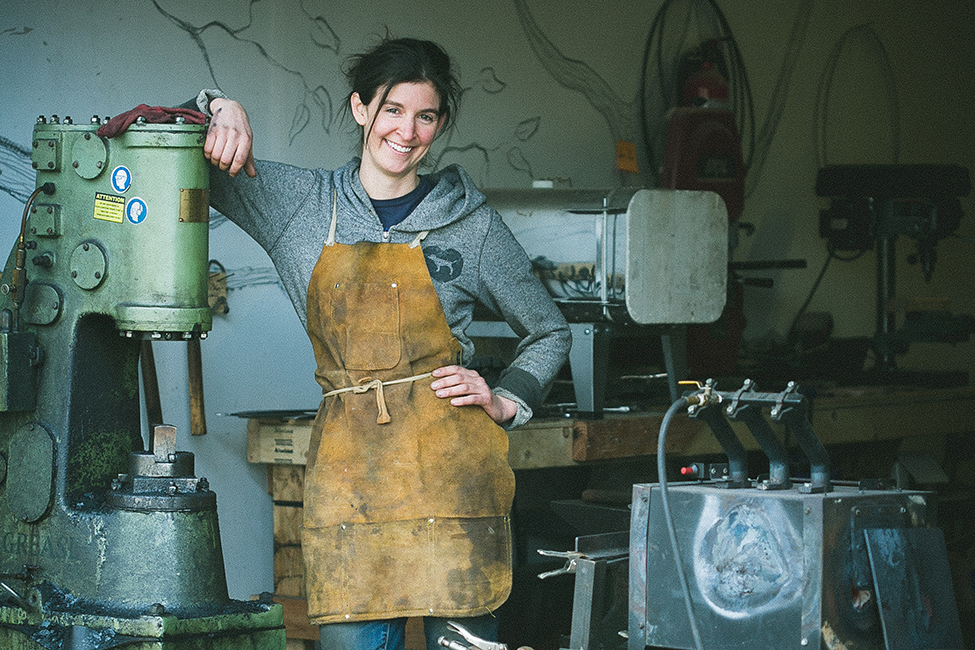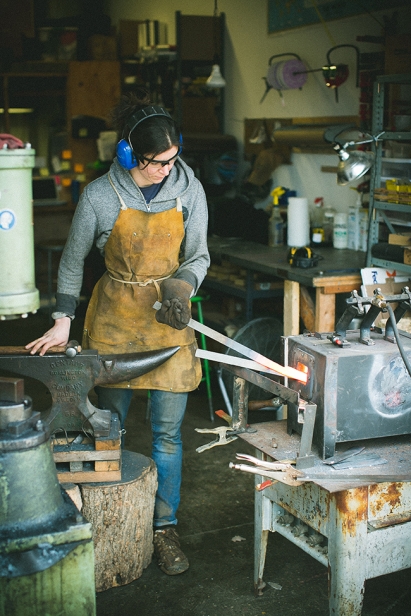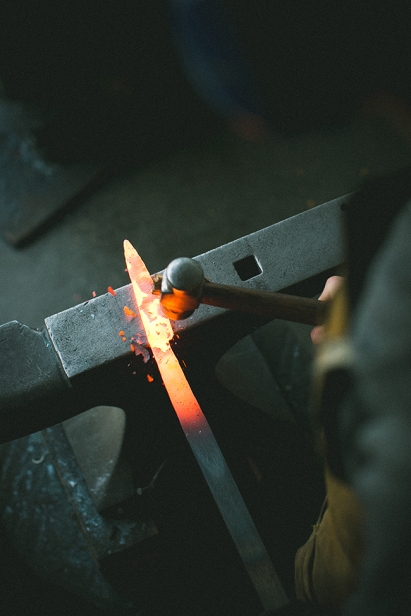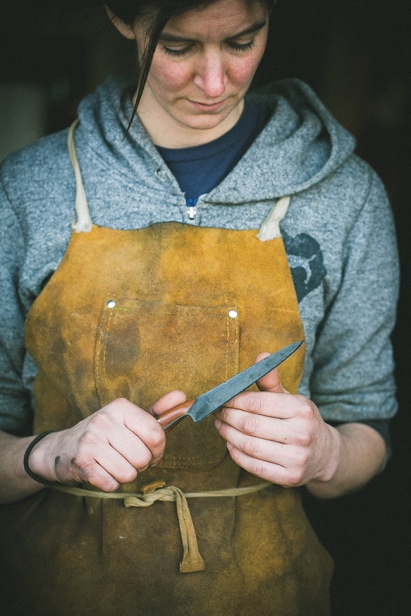MOUNTAIN PEAK
Moriah Cowles
From the mountains of Colorado to the hills of North Carolina to Maine, Mexico and Brooklyn and finally to home-state Vermont, this journey weaves a tale of learning to craft elegant hand-forged knives—and in such demand—you are certain to wait.
Have you ever fallen in love with a knife? A culinary one, that is. After one visit to the Orchard Steel website I was smitten. Before I even had an opportunity to touch one of these elegant knives, I began saving my pennies, nickels and dimes. Someday, I will own one of Moriah Cowles’s knives. I already know that it will be passed down for generations along with stories of the culinary creations that will be chopped from this knife—the garlic, the onions, garden-fresh tomatoes and cucumbers.
These thoughts swirled through my head long before I met up with Moriah Cowles, a young talented bladesmith, at her garage bay work space in Burlington. Here, amid anvils, hot ovens, forges and hammers, four types of culinary knives are handcrafted by a woman who loves her work. Each knife has its own unique story to tell, from the metal that was forged or the wood that was carefully crafted to the pins that add character—all create the perfect balanced knife.
Cowles’s story begins in Colorado with a summer class in blacksmithing in between terms at Colorado College. This tall young woman with long brown hair and a warm smile fell in love. Blacksmithing was elemental: fire-muscle-sweat combined with creating something useful and elegant. The marriage of masculine medium with feminine forms and curves seemed to be exactly what she was seeking as a college art minor.
As the daughter of Nick and Cindy Cowles, owners of the well-known Shelburne Orchards, hard work was part of Cowles’s childhood. After college, she returned briefly to help out in the orchard until another blacksmithing class in the North Carolina hills at the John Campbell Folk School lured her south. Her love of steel, fire, grinding and hammering continued. Her first knife was made from a railroad spike. It began her clear focus and honed her desire to get really accomplished at making hand-forged culinary knives.
During a biking trip to Mexico and a brief stint WWOOFing, she met a Mexican knife maker who she apprenticed with for six weeks and continued her path to perfecting the knife craft. Her next stop was the New England School of Metalwork in Auburn, Maine, for another class.
The stars aligned when she was given an opportunity to work under the tutelage of mentor and friend Joel Bukiewicz at Cut Brooklyn. She packed up her belongings in apple crates, headed to Brooklyn in her pickup truck and learned to make and sell her own knife creations with his guidance.
A Wall Street Journal feature, The Off Duty Fall 50 for “must have” items in 2014, included Cowles’s hand-forged culinary knives, and business went from a two-week wait to one and half years. Terrifying for a woman who works alone with some recent part-time help, but also exciting. The day we interviewed, she had just completed the orders, making four to five a week, taking almost two years. Recently Cowles has established a new business model that offers more freedom to enjoy a little time away from her beloved craft. She will post available knives on her website at least once a month.
Cowles’s knives are eight to 16 inches long, made from carbon steel and local wood. She makes paring knives, petite chef’s knives, steak knives and chef’s knives. Her design is influenced by a combination of the Japanese gyuto and French sabatier styles that she shifted and reworked into her own design. The wood on the handles is often applewood harvested from her parents’ land but includes other varieties like black walnut and sprouted maple. The small pins are intricate and unique.
And what does it take to create knives this beautiful? Steel, heat, a sander, a forge, skill and dedicated hard work. Clearly Cowles has to be careful every step of the process to ensure safety. Each knife takes about eight to 12 hours and begins to reveal itself as it is forged. An organized system of labeling allows Cowles to ensure which wooden knife handle attaches to what blade. Her charming work space in Burlington has a sense of order and flow.
“I can’t imagine not having art in my life, and I love this product and the process, “ she says. “I love working with my hands and creating something useful. It will always be part of my life, no matter what else I end up doing.”
I was clearly glad to hear this. It’s going to take some time for me to save up for one of these magnificent knives, as prices start at $275. Countless other people like me will also wait—because some of the finest things in life are worth the wait.
Laurie Caswell Burke looks forward to owning an Orchard Steel knife someday. It promises to be a treasured addition to her kitchen—a place she loves to create good home-cooked food for friends and family.








